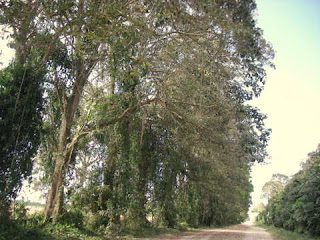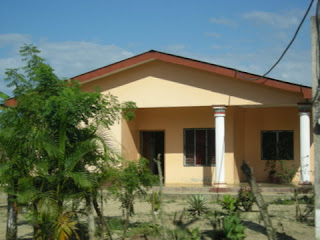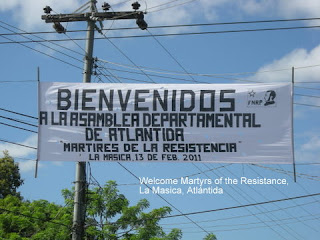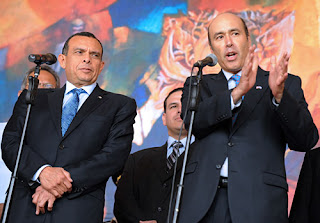Being the fearless, dedicated blogger that I am, El Jefe took me to Tripoli yesterday to hear first-hand what the people think about what is going on — "What?!!!!", I can hear you asking! You went to Tripoli? Yes, Tripoli, Atlántida, Honduras, that is. ;-) Since we were on a road trip, we swung by Caracas (Honduras) as well. Our initial plan was to visit Paris (Paris de Leán, Honduras), too, but we ran out of time. Traveling on those bumpy, back roads takes hours!
 The whole north coast of Honduras, from El Progreso to Trujillo was without electricity on Sunday for maintenance work so it seemed to be a good day for a road trip. No-hay-luz days are like national holidays with everyone heading out to visit with family or go to the beach. Sunday traffic is usually sparse but yesterday it was like rush hour with everyone heading somewhere else. (Click on any of the photos to enlarge for a better view.)
The whole north coast of Honduras, from El Progreso to Trujillo was without electricity on Sunday for maintenance work so it seemed to be a good day for a road trip. No-hay-luz days are like national holidays with everyone heading out to visit with family or go to the beach. Sunday traffic is usually sparse but yesterday it was like rush hour with everyone heading somewhere else. (Click on any of the photos to enlarge for a better view.)Tripoli is a little pueblo in the municipio (municipality, which is kind of like a county in the US) of Masica in the departmento (state or province) of Atlántida. We were curious how Tripoli got its name and what the people thought about what was going on in Tripoli, Libya, if they were aware of it.
 We had our plan in place, including printing some Google maps, mapping out the back road scenic route, and writing down the questions we wanted to ask. I was prepared with four sets of batteries, hoping for some great video interviews. The best made plans, however .... well, you know how that goes in Honduras! We didn't find anyone who had too much awareness about Libya or where the name Tripoli came from, so we went on to plan B, which was to find out more about the life in Tripoli, Honduras.
We had our plan in place, including printing some Google maps, mapping out the back road scenic route, and writing down the questions we wanted to ask. I was prepared with four sets of batteries, hoping for some great video interviews. The best made plans, however .... well, you know how that goes in Honduras! We didn't find anyone who had too much awareness about Libya or where the name Tripoli came from, so we went on to plan B, which was to find out more about the life in Tripoli, Honduras.The 2001 Honduras census lists Tripoli as having a population of 799 living in 180 homes. As the map shows, Tripoli is in a low area, and we found out later that in the early years (1920s - 1930s), parts of it were actually under water and much of it was planted in rice fields. Now much of the area is used for raising cattle and cultivating corn, as well other crops. A current resident estimates that the population may now be about 1,000.
 The little pueblo included no businesses that we saw other than a few pulperías (sort of small mom and pop type convenience stores — read more about pulperías here). The community is somewhat self-sufficient with small crops of bananas, yuca, coconuts, and other staples. Meat is obtained from backyard (or free range) chickens, pigs, and cows. Many people fish in the nearby rivers. The campesinos occasionally travel to nearby Masica or take a longer trip to La Ceiba for more extensive shopping.
The little pueblo included no businesses that we saw other than a few pulperías (sort of small mom and pop type convenience stores — read more about pulperías here). The community is somewhat self-sufficient with small crops of bananas, yuca, coconuts, and other staples. Meat is obtained from backyard (or free range) chickens, pigs, and cows. Many people fish in the nearby rivers. The campesinos occasionally travel to nearby Masica or take a longer trip to La Ceiba for more extensive shopping. A village elder told us that a creek was filled in and the road was built during the administration of Roberto Suázo Cordova (1982-86, the first democratically elected president under the current constitution). The road is gravel but extremely wide by Honduran standards so it will be nice if and when it finally gets paved.
A village elder told us that a creek was filled in and the road was built during the administration of Roberto Suázo Cordova (1982-86, the first democratically elected president under the current constitution). The road is gravel but extremely wide by Honduran standards so it will be nice if and when it finally gets paved.  One thing that I really noticed was that most everything was neat and tidy and even some very poor looking homes were well maintained. No piles of trash in front of the houses or strewn along the road as we so often see in La Ceiba.
One thing that I really noticed was that most everything was neat and tidy and even some very poor looking homes were well maintained. No piles of trash in front of the houses or strewn along the road as we so often see in La Ceiba.Our interviewees informed us that Tripoli has had running water for approximately 20 years. A line was run from up in the mountains, then under the highway and on to their village, which the sign says is about 7.5 km. (about 4.75 miles) from the highway. (I'm not too sure about that mileage. We both thought that it seemed much further than that and took at least 20 minutes to drive.) Water is generally available 24 hours a day, unless a pipe gets broken or some other maintenance is needed. I saw water running from an outside faucet during the entire time we were there so awareness of the need for conservation has not arrived.
 Tripoli has had electricity only for about three years, but residents have jumped full force into current times with many, many of the houses, even the most modest, sporting these Claro TV satellite dishes!
Tripoli has had electricity only for about three years, but residents have jumped full force into current times with many, many of the houses, even the most modest, sporting these Claro TV satellite dishes!The people were relatively satisfied with their local mayor who they believe has accomplished some projects for them and with the Masica municipal government. The only complaint that we heard was about the road, which hadn't been graded in more than a year and was quite bumpy and dusty. The mayor has promised to pave it, and "we'll see" was the general attitude. The mayor says (as all politicians do!) that he is hampered by the debts left by previous administrations. They said that the area is muy tranquilo (very tranquil, quiet, laid back) with no crime problems.
 When it came to the national government, everyone proudly proclaimed their "colors" (blue = Nacionalista or red = Liberal) without being asked, but admitted that it didn't seem to matter what was promised by the politicians or which color they were, that they were all the same when they got into office and forgot about small communities like this.
When it came to the national government, everyone proudly proclaimed their "colors" (blue = Nacionalista or red = Liberal) without being asked, but admitted that it didn't seem to matter what was promised by the politicians or which color they were, that they were all the same when they got into office and forgot about small communities like this. Though we didn't even ask, it was interesting is that two of the old-timers brought up President Tiburcio Carías Andino (1933-49) as being the worst president, who "treated the people like slaves", according to Don Jesús. Doña Elsa said that he didn't allow women to have any rights. (Wikipedia states that Carías was pressured to leave power by the US government.) Although these were two separate interviews in different locations, both also remembered President Roberto Suázo Cordova with fondness, saying that he liberated the country and gave rights to women. When asked their opinion about current President Pepe Lobo, we were met with shrugs and "¿Donde están los cambios?" (Where are the changes?), referring to Pepe's campaign slogan, "Cambio Ya!" (Change Now!)
Though we didn't even ask, it was interesting is that two of the old-timers brought up President Tiburcio Carías Andino (1933-49) as being the worst president, who "treated the people like slaves", according to Don Jesús. Doña Elsa said that he didn't allow women to have any rights. (Wikipedia states that Carías was pressured to leave power by the US government.) Although these were two separate interviews in different locations, both also remembered President Roberto Suázo Cordova with fondness, saying that he liberated the country and gave rights to women. When asked their opinion about current President Pepe Lobo, we were met with shrugs and "¿Donde están los cambios?" (Where are the changes?), referring to Pepe's campaign slogan, "Cambio Ya!" (Change Now!) The pueblo includes a nice school that was built during the Maduro administration (2002-2005) and several churches. Initially we were told that the teachers never strike there, but while talking to a younger man who lived across the street from the school, we found out that the Resistance teachers locked out the children pretty frequently last year, but so far this year (two weeks) the teachers hadn't missed any days. He said it was a shame especially because so many of the children walk a long distance with their backpacks from other even smaller villages and are so disappointed when they don't have school.
The pueblo includes a nice school that was built during the Maduro administration (2002-2005) and several churches. Initially we were told that the teachers never strike there, but while talking to a younger man who lived across the street from the school, we found out that the Resistance teachers locked out the children pretty frequently last year, but so far this year (two weeks) the teachers hadn't missed any days. He said it was a shame especially because so many of the children walk a long distance with their backpacks from other even smaller villages and are so disappointed when they don't have school.  We had seen a big sign welcoming the Resistance "Martires" at the highway turn off to the town of Masica so we asked this younger man, the grandson of Don Jesús, if there was a lot of support for the FNRP in that area and whether they were admired as martyrs (heheheh — trying very hard not to show our personal opinion in order to get a frank response). He responded with something like "Pfffft!" "More like delinquents!" he said. He told us that those same teachers are the ones who put up the sign.
We had seen a big sign welcoming the Resistance "Martires" at the highway turn off to the town of Masica so we asked this younger man, the grandson of Don Jesús, if there was a lot of support for the FNRP in that area and whether they were admired as martyrs (heheheh — trying very hard not to show our personal opinion in order to get a frank response). He responded with something like "Pfffft!" "More like delinquents!" he said. He told us that those same teachers are the ones who put up the sign. I was surprised to see that Tripoli had a Centro de Salud (health center) in which we were told that a nice lady doctor attended to people 5 or 6 days a week. It looked like a tidy, well-maintained little building (lost the photo). I had no idea that Centros de Salud were available in such small towns. Don Pedro, who had agreed to be our guide, also pointed out the two nice soccer fields for the young people. We all laughed about him being our tour guide since Tripoli basically only has the one street.
I was surprised to see that Tripoli had a Centro de Salud (health center) in which we were told that a nice lady doctor attended to people 5 or 6 days a week. It looked like a tidy, well-maintained little building (lost the photo). I had no idea that Centros de Salud were available in such small towns. Don Pedro, who had agreed to be our guide, also pointed out the two nice soccer fields for the young people. We all laughed about him being our tour guide since Tripoli basically only has the one street. Don Pedro, who is originally from Ocotepeque, described Tripoli as a 'zona de trabajo' (work area) and a very nice place to live. When asked about availability of work in the area, both Don Pedro and Don Jesús stated that there was agricultural work, but that was all. Many of the people that we talked to during the day had sons or other relatives living in the larger Honduran cities or in the US and seemed sad about that. Oh, in case you aren't familiar with the term, 'Don' and Doña (for females) are common terms of respect when referring to others, especially older people.
Don Pedro, who is originally from Ocotepeque, described Tripoli as a 'zona de trabajo' (work area) and a very nice place to live. When asked about availability of work in the area, both Don Pedro and Don Jesús stated that there was agricultural work, but that was all. Many of the people that we talked to during the day had sons or other relatives living in the larger Honduran cities or in the US and seemed sad about that. Oh, in case you aren't familiar with the term, 'Don' and Doña (for females) are common terms of respect when referring to others, especially older people.I love these road trips out into the country and the small villages. I have a ton more photos from Tripoli and the various pueblos of Burgos, Orotina, El Gancho, Cáceres, and Caracas that we drove through that I'll be posting soon. These last two photos are of the mountains as we neared the highway when leaving Tripoli.

I also want to tell you more about Don José de Jesús Medina, Don Pedro Alberto Flores, and Doña Elsa Gloria Ventura from Tripolí, as well as Don Leonidas Flores Espinosa and his wife Norma Medina from El Gancho. I promised some of them that I would post their photos and mention them by name so that their family in the extranjera could see them. There may have been some disappointment that we weren't from "the media", but the mysterious internet .... well, at least that's something. ;-)












 Welcome to my Blogicito —
Welcome to my Blogicito — 








